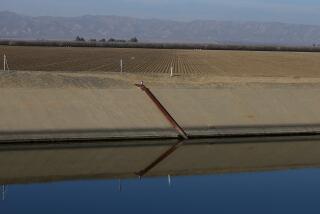The West Was Spoiled, Not ‘Won’
- Share via
The following is from a lecture given by California novelist Wallace Stegner at the University of Michigan School of Law and published in the spring volume of the Michigan Quarterly Review.
A principal justification for the Newlands Act (of 1913) was that fabled Jeffersonian yeoman, that small freehold farmer, who was supposed to benefit from the Homestead Act, the Desert Land Act, the Timber and Stone Act, and other land-disposal legislation, and rarely did so west of the 98th meridian. The publicized purpose of federal reclamation was the creation of family farms that would eventually feed the world and build prosperous rural commonwealths in deserts formerly fit for nothing but horned toads and rattlesnakes. To ensure that these small farmers would not be done out of their rights by large landowners and water users, Congress wrote into the act a clause limiting the use of water under Reclamation Bureau dams to the amount that would serve a family farm of 160 acres.
Behind the pragmatic, manifest-destinarian purpose of pushing Western settlement was another motive: the hard determination to dominate Nature, which historian Lynn White, in a well-known essay, identified as part of our Judeo-Christian heritage. Nobody implemented that impulse more uncomplicatedly than the Mormons, a chosen people who believed the Lord when he told them to make the desert blossom as the rose. Nobody expressed it more bluntly than a Mormon hierarch, John Widtsoe, in the middle of the irrigation campaigns: “The destiny of man is to possess the whole earth; the destiny of the earth is to be subject to man. There can be no full conquest of the earth, and no real satisfaction to humanity, if large portions of the earth remain beyond his highest control.”
That doctrine offends me to the bottom of my not-very-Christian soul. It is related to the spirit that builds castles of incongruous luxury in the desert. It is the same spirit that between 1930 and the present has so dammed, diverted, used and reused the Colorado River that its saline waters now never reach the Gulf of California, but die in the sand miles from the sea; that has set the Columbia, a far mightier river, to tamely turning turbines; that has reduced the Missouri, the greatest river on the continent, to a string of ponds; that has recklessly pumped down the underground water table of every Western valley and threatens to dry up even so prolific a source as the Ogalalla Aquifer; that has made the Salt River valley of Arizona, and the Imperial, Coachella and great Central valleys of California into gardens of fabulous but deceptive richness; that has promoted a new rush to the West fated, like the beaver and grass and gold rushes, to recede after doing great environmental damage.
The Garden of the World has been a glittering dream, and many find its fulfillment exhilarating. I do not. I have said that I think of the main-stem dams that made it possible as original sin, but there is neither a serpent nor a guilty first couple in the story. In Adam’s fall we sinned all. Our very virtues as a pioneering people, the very genius of our industrial civilization, drove us to act as we did. God and Manifest Destiny spoke with one voice urging us to “conquer” or “win” the West; and there was no voice of comparable authority to remind us of Mary Austin’s quiet but profound truth, that the manner of the country makes the usage of life there, and that the land will not be lived in except in its own fashion.
Obviously, reclamation is not the panacea it once seemed. Plenty of people in 1987 are opposed to more dams, and there is plenty of evidence against the long-range viability and the social and environmental desirability of large-scale irrigation agriculture. Nevertheless, millions of Americans continue to think of the water engineering in the West as one of our proudest achievements, a technology that we should export to backward Third World nations to help them become as we are. We go on praising apples as if eating them were an injunction of the Ten Commandments.
The University of Michigan, 1987. Reprinted with the author’s permission.
More to Read
Sign up for Essential California
The most important California stories and recommendations in your inbox every morning.
You may occasionally receive promotional content from the Los Angeles Times.










